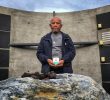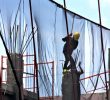By GRACE S. UDDIN | Davao Today
Davao City- Peace talks with the Communist rebels is getting dim as government continues to insist on a ceasefire as a precondition of the peace talks while the rebel group pressures the government to drop it from European Union terror list.
Presidential Peace Adviser Hermogenes Esperon Jr, said the government still insists on a ceasefire before the holding of the peace talks so that the rebels can prove that they are not terrorists, after all.
“Peace talks cannot go on if rebels continue to burn buses and telecommunication towers,” he said. “It’s difficult if you just go to the negotiation table without a ceasefire.”
He also said that removing the rebel group from the list of terrorist organizations is something the government cannot do because the Philippines cannot dictate on other countries like Europe to drop off the NPA from the foreign terrorists list.
The Oslo-brokered talks between the government and the National Democratic Front were stalled after members of the NDF panel walked out of the negotiations in 2004 to protest the groups’ inclusion in the EU terror list.
Esperon said the government is still exploring ways to resume peace talks with the rebel group. Should the rebels stay firm in their conditions, it would really be hard, he said.
In a statement, the NDF blamed the government for putting up more obstacles for the resumption of the talks. The group said the government’s insistence on a ceasefire and the inclusion of the CPP/NPA in the terror list violated the agreement signed at The Hague, Netherlands between the government and the NDF.
“In demanding for a ceasefire as a precondition to the peace talks, the Arroyo regime violates The Hague Joint Declaration which requires that the peace negotiations address the roots of the armed conflict with social, economic, political and constitutional reforms,” said Luis Jalandoni, chairperson of the NDF negotiating panel. “The declaration said that no precondition whatsoever shall be imposed by one side on the other,” he said.
The NDF also cited the illegal “suspension” of the Joint Agreement on Safety and Immunity Guarantees (Jasig); various human rights violations, including the persecution, murder, arrest and enforced disappearance of NDF consultants; and the refusal of the government to indemnify human rights victims under the Marcos regime, among the obstacles of the peace talks.
“It is the obligation of the government to comply with the agreements it has signed with the NDF, otherwise, it blocks the way for the resumption of the formal talks,” said Jalandoni.
The statement said that the Norwegian government facilitated informal talks between the NDF and the government in May this year to find ways for the peace talks to resume amidst all obstacles. But the NDF was disappointed at the results.
Esperon said that in the absence of the peace talks, government taps the Local Peace Security Assembly to entice the rebels to go back to the folds of the law.
The absence of peace talks also increased rebels’ offensives, which recently included the raid of municipal station in Banaybanay, Davao Oriental; the burning of a Davao Oriental cell site; the attack against the 3rd Special Forces Battalion-Philippine Army in Nabunturan, Compostela Valley; the attack against the Asares and JBMC mining firms in Mt. Diwata, Monkayo, Compostela Valley and the raid of police station in Dapa, Surigao del Norte in a span of two weeks.
Concerns over recent NPA attacks in the region and in other parts of Mindanao alarmed the business sector, particularly the members of Mindanao Business Council, who vowed to support all peace efforts of the government.
Esperon was in Davao in a forum at the Mindanao Economic Development Council where he also discussed the peace talks between the government and the Moro Islamic Liberation Front. (Grace S. Uddin/ davaotoday.com)
Peace Process









